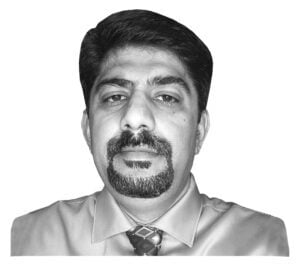What ails higher education
Balochistan is supposed to be the centre of attention for the Chinese government and its global partners for multiple reasons because it is the geography of the province that makes it prominent. It has witnessed large-scale infrastructure development such as China’s Belt and Road Initiative (BRI).
The Chinese approach to development is integrated and realistic; hence their infrastructure development is focused on human development. And since education is one of the strongest indicators of human development, China has introduced scholarships for Pakistani students along with opening avenues for enhancing cooperation in business and trade.
On September 29, the Higher Education Commission (HEC) Chairman Dr Mukhtar Ahmed proposed to the Chinese Ambassador Mr Nong Rong the setting up of a one-window service to deal with scholarships for Chinese universities. The proposal was made during the Ambassador’s visit to the HEC where ‘pre-departure ceremony for 36 students set to join Chinese universities’ was held.
According to the HEC, “So far, 193 Pakistani students have been awarded scholarships under the Chinese Government Scholarship Programme, including 40 in 2019, 58 in 2020, 59 in 2021 and 36 this year.”
But the Pakistani students have faced hardship in getting back to their universities in China after the Covid-19 pandemic grabbed public attention, giving birth to rumours about China. When an institution deals with higher education scholarships, it basically deals with the subject of internationalisation. When students from developing countries like Pakistan cross international borders, they carry the baggage of what our education had given them. Hence, reaching a global university of good ranking in a developed country like China is a big thing for them.
There are many misconceptions about higher education which needs to be addressed at the time of making policy decisions. In Pakistan, it is perceived that higher education degrees changes the basic personality traits of students. As someone teaching media and communication for over a decade, I am convinced that higher education does not alter one’s personality. Many expert educationists have found that it is the primary education of a child that forms his/her personality.
Thankfully, the government has done away with the heavily Talibanised curricula of primary education. But the gradual radicalisation of students at school level could not be countered at universities for xenophobia and hate are often fanned in universities in the name of religion and nationalism. What takes the cake is that some of the hate-fired initiatives are dressed as research projects.
After the inception of Pakistan, the US had replaced the UK as the choice destination for Pakistanis to go for higher education. Over the decades, the US has sustained its position, followed by Europe. The idea of the American dream has been passed from generation to generation. Hence, Pakistanis identify themselves more with Americans.
Although Pakistan is geographically close to China and far away from the US, but the US successfully made this distance irrelevant with an effective use of the tools of mass communication to a degree that being Americanised has become a snobbery. In Pakistan, people bracket America with Europe, though the two are poles apart.
When President Pervez Musharraf set up the HEC, he consciously institutionalised these snobberies, introducing special incentives for those studying abroad, in most cases at the US and EU. Since the universities here had already been beholden to the US and the EU for their development, functioning and study material, it will not be a misstatement to say that higher education in Pakistan is in an overdrive for westernisation.
This is a one-way drive, resulting in no uplift in the standard of education. Pakistani students go abroad to study, but later turn into economic migrants by starting a job or setting up a business. The majority of those who return to their native country are the ones who had faced multiple failures to settle down in the West. They are then perched at key offices in our higher education sector, hampering growth of indigenous talent.
It is a matter of shame that Pakistani universities could hardly get a place in top universities of the world. The outgoing HEC Chairman Dr Tariq Banuri was not wrong in stating that the higher education system is producing pygmies. No wonder that we witnessed violence against Chinese teachers by Baloch nationalists and fanatics.
The intensity of cultural shocks that Pakistani students feel at the time of going to China or returning from the US is almost similar. It is because social scientists are discouraged in the decision-making process. There is a need for an overhaul of our higher education system to make it compatible with the modern world.
Pakistani students are among top scholarship winners the world over. It would be a big achievement if the HEC and China together succeeds in making the process of application easier.
The writer teaches mediatization at IIUI










